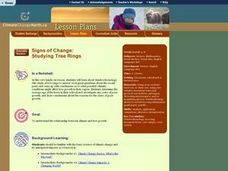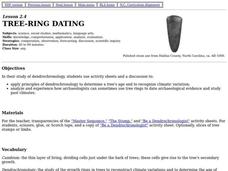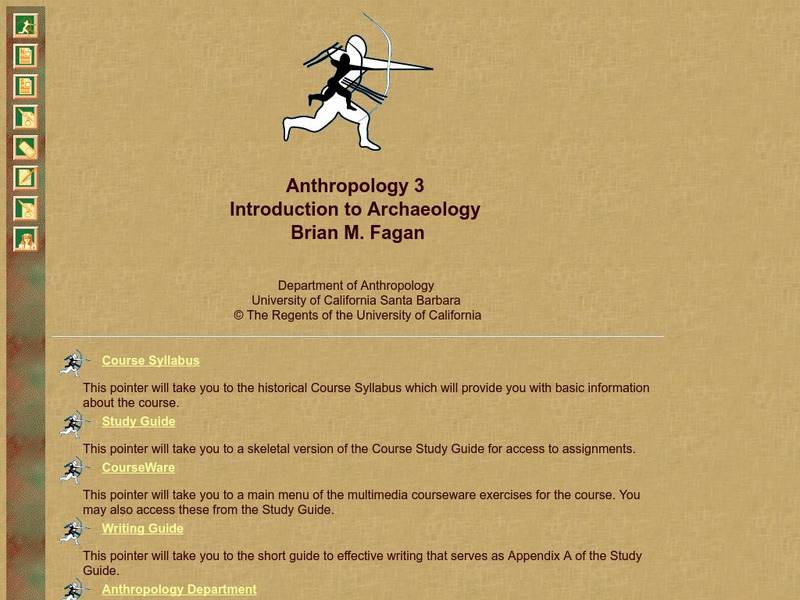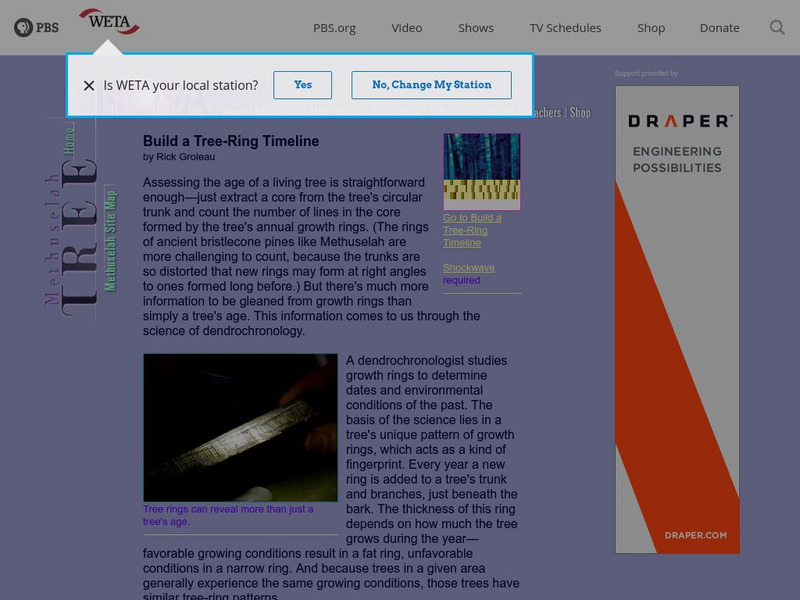Curated OER
Signs of Change: Tree Rings
Students identify and experiment with dendrochronology (the study of tree rings to answer ecological questions about the recent past) and come up with conclusions as to what possible climatic conditions might affect tree growth in their...
Curated OER
Tree-Ring Dating
In this tree-ring dating worksheet, students use activity sheets to determine a tree's age and to observe changes in climate from the tree-rings. Students investigate how archaeologists use tree rings to date evidence and they answer 5...
Curated OER
Aging of Trees
Students examine tree rings to determine its age. In this tree ring lesson, students examine core tree samples, identify the tree rings, and then determine its age. Students complete a worksheet, deciding which of the two core...
Curated OER
Trees: Are They Thriving or Surviving?
In this trees survival lesson plan, 8th graders discuss what trees need to grow, brainstorm things that could adversely affect tree growth, and compare characteristics of thriving trees vs. surviving trees. Students learn about the...
Curated OER
How Old Is This Tree?
Learners work in pairs to determine the age of a tree using two different methods in this experiment. They collect data about how trees change over time.
Curated OER
Reading Trees: Understanding Dendrochronology
Students examine tree-ring dating and discuss the lack of water the settlers in Jamestown faced. They create paper tree rings, simulate rain patterns, and describe the history of construction paper tree sequences.
Curated OER
Science: The Age of the Redwoods
Students discover how to estimate the age of redwood trees. They measure the trees' diameters by using string to calculate the circumferences. Students conclude by discussing the science of dendrochronolgy.
Curated OER
Tree-ring Dating
Students complete activity sheets and participate in discussions while they study dendrochronology. They determine a tree's age and recognize how the climate varied over time.
University of Maryland
Maryland Sea Grant: Dendroclimatology
This is a set of lessons where students investigate tree rings and what scientists can learn from them. They measure tree rings and correlate the data to precipitation patterns in order to make predictions about the climate. For an...
University Corporation for Atmospheric Research
Ucar: Tree Rings and Climate Timeline Simulation
In this online interactive activity, you will align tree ring cores to build a long chronology of climate history.
NOAA
Noaa: Be a Tree Ring Detective [Pdf]
Discover the reason why trees have rings. Then use your skills of inquiry to decide which tree samples are the oldest, based on their rings.
University of Colorado
University of Colorado: Signs of Change: Studying Tree Rings
Students gather information from real tree core samples and compare them with local climate history.
University Corporation for Atmospheric Research
Ucar: Introduction to Climate
A detailed overview of the Earth's climate, with explanations about the difference between weather and climate, dendrochronology, palynology, and how Earth's climate has changed over time. All information is reinforced through pictures,...
University of California
Ucsb: Archserve: Exercise 1 2: Chronological Methods
A resource highlighting the process of dating methods in archaeology. Look at Relative Dating and Absolute Dating systems.
PBS
Nova: Build a Tree Ring Timeline
This activity is an introduction to the branch of science called dendrochronology. Discover what this science tells us about the past and see if you can create a tree ring timeline by matching up band patterns from several different trees.
PBS
Pbs Teachers: Methuselah Tree
Examine how scientists determine the age of living and non-living trees and identify factors that impact sizes of tree rings. Analyze tree ring samples and determine the age of the oldest sample.
Science Struck
Science Struck: Relative vs. Absolute Dating
Explains what relative and absolute dating are and some different methods used for each. A Venn diagram is presented showing what characteristics they share and how they differ.















